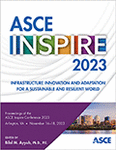Safeswim: Integrating Real-Time Monitoring and Modeling for Near-Term Predictions of Water Quality
Publication: ASCE Inspire 2023
ABSTRACT
Originally implemented in 1995 to communicate bathing water quality to the public, Auckland Council’s water quality management program provided an assessment based on retrospective water quality sampling. Safeswim (www.safeswim.org.nz) was deployed in 2017 to overcome limitations related to sampling data availability and to maximize the use of water monitoring data by integrating such data with real-time modeling, artificial intelligence, big-data analytics, visualization, and information dissemination. Safeswim is shaped around a single, central data platform Moata that gives Safeswim its capacity for managing and analyzing large, diverse datasets while running multiple models to provide Aucklanders with information updated in 15-min intervals. The platform has facilitated Safeswim’s greatly increased reliability and prediction performance over five years on from its first implementation, to close to 90% overall accuracy, and as a result has grown into a reliable and efficient public decision support system for the Auckland Council. The success of Safeswim in Auckland has led other communities around the world to consider and are inspired to implement similar programs.
Get full access to this article
View all available purchase options and get full access to this chapter.
REFERENCES
S. Couper, N. Brown, D. Blackburn-Huettner, and M. Neale. (2019). Safeswim – Or Troubled Waters? Auckland’s Smart Customer Engagement Initiative, OzWater Water Conference 2019.
WHO (World Health Organization). (2021). Guidelines on Recreational Water Quality.
J. Allpress, A. Clark, E. Rootham, and T. Huang. (2018). Safeswim Impact Evaluation - Have improvements to Safeswim changed Aucklanders’ awareness and behaviour?.
Ministry for the Environment. (2020). National Policy Statement for Freshwater Management 2020.
M. Leonard, and C. Eaton. (2021). Recreational Water Quality Guidelines Update, Ministry of Health.
D. R. Helsel, and R. M. Hirsch. (2002). Statistical methods in water resources: U.S. Geological Survey Techniques of Water-Resource Investigations, book 4, chap. A3, last accessed June 2023 at http://pubs.er.usgs.gov/pubs/twri/twri04A3.
D. S. Francy, and R. A. Darner. (2006). Procedures for developing models to predict exceedances of recreational water quality standards at coastal beaches: U.S. Geological Survey Techniques and Methods 6–B5, 34 p, last accessed June 2023 at https://pubs.usgs.gov/tm/2006/tm6b5/pdf/tm6B5_web_rev120706.pdf.
N. E. Carpenter, L. B. Clarke, S. Vernall, and P. Klinac. (2020). Auckland’s Shoreline Adaptation Plans: starting the conversation about coastal change.
Information & Authors
Information
Published In
History
Published online: Nov 14, 2023
ASCE Technical Topics:
- Business management
- Data analysis
- Engineering fundamentals
- Environmental engineering
- Infrastructure
- Infrastructure resilience
- Management methods
- Methodology (by type)
- Practice and Profession
- Public administration
- Public health and safety
- Quality control
- Research methods (by type)
- Safety
- System reliability
- Systems engineering
- Systems management
- Water and water resources
- Water management
- Water quality
- Water sampling
- Water treatment
Authors
Metrics & Citations
Metrics
Citations
Download citation
If you have the appropriate software installed, you can download article citation data to the citation manager of your choice. Simply select your manager software from the list below and click Download.
